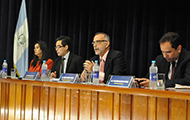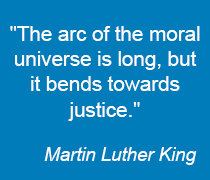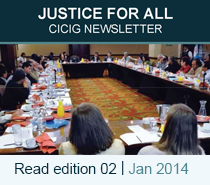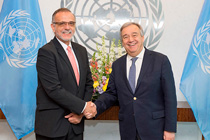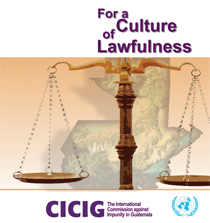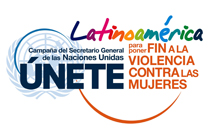PRESS RELEASE 090
REPORT PRESENTED ON IMPUNITY FOR ATTACKS ON JOURNALISTS
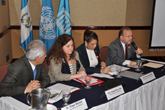 Guatemala, November 22, 2012. At the presentation of the report titled "Impunity for Freedom of Speech Violations in Latin America", Commissioner Francisco Javier Dall'Anese Ruiz, judicial authorities and government authorities underlined the importance of the media's scrutiny role in any democracy.
Guatemala, November 22, 2012. At the presentation of the report titled "Impunity for Freedom of Speech Violations in Latin America", Commissioner Francisco Javier Dall'Anese Ruiz, judicial authorities and government authorities underlined the importance of the media's scrutiny role in any democracy.
The document, which highlights threats made against journalists by public office-bearers and individuals involved in organized crime, was presented by the International Freedom of Expression Exchange network (IFEX-ALC) and CERIGUA—its affiliate in Guatemala—in celebration of the International Day against Impunity. Attorney General Claudia Paz y Paz, Vice-President Roxana Baldetti and UNESCO Representative, Edgar Montiel, also attended the event to comment on the report.
"Democracy cannot exist without informal oversight, such as that conducted by the media, which goes beyond legal methodology and clearly informs the people and influences the creation of public opinion".
Francisco Dall´Anese
CICIG Commissioner
"Having served as a prosecutor and judge for all my life, I share the media's ideal of seeking the truth, accountability and transparency—the key ingredients in a democracy," declared the head of CICIG in his remarks regarding the report.
He went on the say that a number of people have dedicated their whole lives to working in formal oversight for public authorities, be it in a public prosecutors' office or within a judiciary. However, he affirmed that democracy cannot exist without informal oversight, such as that conducted by the media, which goes beyond legal methodology and clearly informs the people and influences the creation of public opinion. According to the Commissioner, such oversight acts as a control in a system of checks and balances and it must be present in a democracy.
Therefore, he stressed that journalists play an important role in the rule of law, and the best indicator of the media's importance in the daily construction of a democracy is the death of communicators, because "if their work did not limit corruption, crime and the abuse of authority, journalists would not be killed. Journalists, much like prosecutors and judges, are also tragically killed because we all seek the truth and transparency in order to build rule of law."
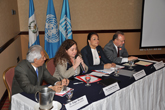 Attorney General Claudia Paz y Paz agreed with the report's findings in the sense that organized crime is the latest threat to freedom of expression and rule of law, and the insecurity faced by communicators working in rural areas.
Attorney General Claudia Paz y Paz agreed with the report's findings in the sense that organized crime is the latest threat to freedom of expression and rule of law, and the insecurity faced by communicators working in rural areas.
"I believe in-depth dialogue between journalists, human rights defenders and judicial authorities to be critical, because in the absence of communication links and trust, it would be difficult for the authorities to conduct effective investigations," declared Paz y Paz.
Vice-President Roxana Baldetti also agreed that journalists in Guatemala's interior are exposed to the greatest risk, and many of the threats come directly from officials who "believe that having been elected—mayors, in the large part—they have the power to decide who speaks positively or negatively of them."
She indicated that behind these "bad officials" is the organized crime that led to them holding public office. In consequence, she stated that journalists do not face complaints made by officials to the director of a media outlet regarding bad press, but rather the intimidation they are subject to consists in killing them when they refuse to be influenced by the interests of such people.
UNESCO representative Edgar Montiel agreed that correspondents face risks on a daily basis in rural areas, and thus he urged authorities to offer appropriate protection to enable them to conduct their work without any barriers.


